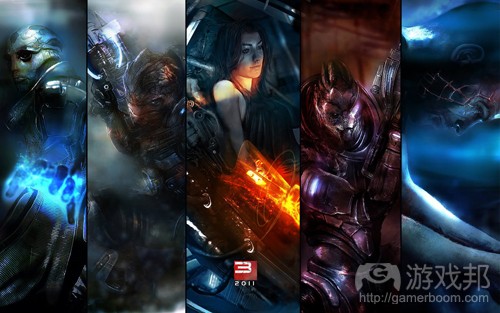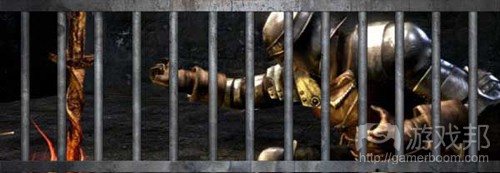举例分析游戏该如何运用IPD战略让玩家受挫
作者:Andreas Ahlborn
如果游戏设计师能够想到在电子游戏中植入旁氏骗局,那将是一种有趣的设计:为达到趣味效果,在游戏的某个特定时刻挫败玩家会怎样?目前,你可以断定,在每款RPG游戏中,角色总难免在某个时刻被捕、卸去所有装备,而后被扔进大牢的境地,徒留他们逃离并收回财产的能力。在故事开端采取这种做法能够吸引玩家,尤其在拥有标志性英雄角色的系列作品中,你会记得自己在最后系列作品的尾声已接近全能者。但显然,为了增加游戏的趣味性,设计师认为有必要在故事的中间或临近尾声引用这种手法。游戏公司也对此进行深入思考,为何不把这种方式发挥到极致?我们可以在故事高潮、或与复仇女神最后对决时刻挫败玩家。而最近在这方面表现最糟的当数《质量效应3》与《刺客信条3》。
我将仔细研究一些作品,借此找出为何在某些罕见的“狱中玩家陷入两难境地”(The Imprisoned Players Dilemma,以下简称IPD)事例中,玩家可以获得正面结果,而大部分游戏却无法实现。
1.典范
在我看来,《质量效应2》能在当中最富有创意地运用IPD战略。它支持玩家导入《质量效应1》中的角色,从而直接为自己创造出两难境地。
如果游戏偏向资深玩家,那么它们会疏远新进玩家。如果游戏忽视资深玩家,只着眼于新用户,那么对资深玩家而言,游戏玩法会变得微不足道,同时你在最后系列中获得的成就也会受到惩罚。但Bioware通过杀死主角取得了游戏平衡。
现在就我所知的所有游戏中,当你复活角色后,你会面临更多挑战,同时玩家的智力值也会相应减少(游戏邦注:比如《星球大战:原力释放2》)。Bioware在这方面的表现尤为突出,你在游戏过程中必须谨慎小心以便让角色复活。
当你的角色从数周手术昏迷中苏醒过来后,显然,即使你导入一个完全成型的角色,他仍无法成为游戏中的强手,即使是借助入门级别教程也毫无作用,角色此时陷入了失忆状态。导入角色只为你提供一些微不足道的优势,比如可以免费使用某些技能点,但你在此却不会有能力被剥夺之感,而是很享受游戏故事作者的奇思妙想。
当然,还有其它典范同样能体现玩家获得进程/复原的感受,以及对IPD战略运用的满足感。《辐射3》以主角诞生为开端,之后玩家会操控他度过童年时期,但在其步入早期成年之前,游戏场景均以自由漫步的荒地为主。你会自然地感受到角色的成长,比如过生日或上学,当角色父亲在序幕结尾抛弃你时,你会强烈感受到执行与之重聚这一任务选项的必要性。
Rockstar甚至可以让玩家完全忽视被IPD控制的事实。但我们难以在开放场景游戏中实现这种手法,因为玩家已经习惯于掌握所有控制权。在《荒野大镖客:救赎》的故事结局,主角在完成所有苦活后,政府人员会要求他去消灭自己原来的黑帮成员。这些政府人员回来后,在接下来的5分钟,主角大部分会在“轨道上”遇害。而开发者的明智之举是不让玩家有机会知道自己已被控制。Rockstar利用编织复杂的过场动画、设置有限的自由漫步模式,以及出色的枪战系列(并非精心制作的quicktime事件),达到这种效果。如果说游戏存在类似谢幕的幻觉,那么就是声誉,你已经拥有了这种东西。游戏的沉浸感已完全掩盖了IPD机制,它只在这个特定时刻发挥作用,你首先感受到的是角色之死的体验,因为你在这一过程中已经同他合二为一,亲眼见证他作为亡命之徒的一生,他已经失去了自由选择权。你只能接受这种命运,因为这就是角色的宿命。
Fromsoft在这方面则更进一步。它并非将IPD战略作为游戏的一部分,而是围绕该机制构造整款游戏。
在《暗黑之魂》的前5分钟,你会掌握一些事实:你会在一个充满危机的世界中醒来,如果在游戏中失败,你将面临多次死亡,而游戏会因此给予严重处罚,因此,你在复活后仍要面对那些之前并未打败的敌人,而且你此时收集的灵魂值也会相应减少。这款游戏极高的难度与其在某部游戏粉丝中的热门程度着实令人惊讶,因为在多数游戏如果出现超能力且能秒杀角色的敌人,只会迅速引来玩家的不满。
其最佳部分是:它不仅违背了《暗黑之魂》中的不成文RPG规则(游戏邦注:比如根据玩家克服障碍的能力,按困难尺度清晰划分开端、中间与结尾区域),而且它还有意在一开始让玩家接触最终任务。理论上,你可以在游戏的前15分钟内进入最后阶段。据说,有些玩家在耗费数小时后并未取得任何进展,因为他们认为开发者不可能制定这种“糟糕”的设计决策。
逐渐掌握《暗黑之魂》的玩法意味着角色死亡次数将减少,当玩家在丧生次数降低的情况下,体验数小时游戏,并逐渐意识到自己正慢慢掌控游戏进程时,他们会进入“下水道”(《暗黑之魂》中的某个区域),并遇到游戏中的唯一的机敏敌人Basiliks。它们会折磨玩家,而后局面开始发生逆转(至少我遇到这种状况)。玩家不仅会死于折磨,而且他在复活后会丧失所有事物,灵魂与生命值也会减半。他会失去力量。而从玩家的最终保存点来看,这种时刻几乎意味着“游戏结束”了。如果你的库存中已经没有解药(其价格十分昂贵),你既无法以全新的复活身份与一大群敌人作战,也没有机会抵达下一个保存点。
如果其它RPG游戏也存在这种“弊端”,那么其开发商必定会面临失败惨境,但Fromsoft是如何侥幸取得成功?他们如何让其演变为一个必要优势?
通过不断地把玩家“囚禁”在游戏世界的幽闭战争中,开发者为他们创造出一种虚幻的“斯德哥尔摩综合症”,也就是“俘虏结合”。你会逐渐“同情”机制中的对抗模式,你真正感受到游戏世界“逮捕/绑架”了你,你喜欢这种“紧张之感”。
2.优劣共存事例
《杀出重围:人类革命》属于特殊事例,它优劣并存地使用了IPD战略:一开始,你的角色是安全局的头目和一名作战专家。在恐怖袭击中遭遇重创后,角色身体的各个部位均换上人造成分,而你需逐渐适应这种转变,因此安装这些“增强附件”可能让角色能力更上一层楼。
我们可以这样解释,玩家会觉得自己如同一个逐渐恢复能力的康复病人:他并不会因为被剥夺能力而感到沮丧,相反,他在选择加强机制后得到了相应奖励。
《杀出重围:人类革命》在设计过程中存在的另一个明显问题实则是糟糕地运用IPD战略。它不仅因拥有最近十年最佳故事情节而出名,遗憾的是,它可能是实现boss战斗机制的最糟例子。为了调和能够抵抗一切boss的超级增强附件“Typhoon”,Square Enix使用了一个小伎俩让玩家误信其增强附件感染了病毒,如果玩家打算“修复”它们,他们就是在自找苦吃,并且不能在对抗最后boss时使用这些增强附件。因此,转变游戏形势,让“Typhoon”机制在战斗中变得无关紧要确实存在难度。
显然,即使金玉难掩败絮。很明显,该游戏中的IPD战略并不适合玩家。只有受虐狂才吃得消这种折磨。
3.糟糕事例
《刺客信条》核心部分存在的严重问题是大部分“超级英雄”作品都会遇到的境况:每个玩家都想成为超人,但Clark Kent数量有限。Clark Kent代表了终极囚禁身份,IPD的化身。由于育碧在《刺客信条1》中明确表示:Desmond Miles(该游戏主角)只是到达目的的手段,再次体验祖先记忆的工具。因此在第一部作品中,Desmond Miles的唯一任务是快速进入Animus(触发记忆的仪器),他不能离开“圣堂武士”监禁的房间,然而,他的超级英雄祖先Altaïr Ibn-La’Ahad却可以自由漫步在充满骑士、宫殿、阴谋与超自然设备的大型中世纪世界中。
当育碧在《刺客信条2》中植入引发精神混乱的流血效应时,Desmonds的现实情况会与祖先记忆重叠,玩家只能借此机会将角色从监狱中解救出来。
然而,事实证明我无法实现这个愿景。育碧并非Rockstar或Naughty Dog,他们并不知道,纯粹地扩展监狱围墙无法解救遭到IPD控制的角色。
Desmond Miles将因成为游戏巨作中无法完全施展才华的角色之一而被载入游戏史册。人们将永远记住,它是游戏中的超人角色。如果这些例子还不够,育碧最新推出的作品中也存在这类弊端。即其中的主角Ratohnhaké:ton(又名:Connor Kenway)。你能否相信:你可以在巨大的开放世界中灵活穿越树木、攀登悬崖、捕猎动物、在一望无际的海洋里驾驶精妙设计的轮船,并在某些关键时刻,开发者觉得有必要采用Quicktime事件这种设置。难道这属于IPD游戏机制的卓越表现?
有时我会在半夜惊醒,全身湿透,希望Connor与他父亲的最后相遇只是一场噩梦,但我又想起育碧打算搞砸主要反派角色的暗杀行动,对此我感到十分失落。如果开发者并未完美塑造Connors父亲这个角色,让玩家一开始便扮演这一角色,并且增加他的可怜境况,那么这种转变(即揭露他是Templars头目的真相)并不会像是一种打击。
因此,在父子重逢并了解对方,发现两者的世界观无法达成一致后,他们的开始战争爆发,而在此过程中,游戏会命令你“利用有利的环境因素”。
现在,我们已经掌握游戏玩法:在靠近瓶子时,按下x键,角色可以利用瓶子作战。在靠近桌子时,按下x键,角色可以依靠桌子消灭敌人。最后,当Connors父亲将其打倒时,玩家可以通过“X”信号知道下一步要做什么,Connors父亲就会因此步入死亡。而这些都发生在扭曲镜头以及我们无法完全掌控自身的情形下。
该例子完美解释了在关键时刻(对抗角色的父亲)采用IPD策略会注定让人难以接受的原因。你会在体验过程中明白这种感觉很“糟糕”。这就好像Pixar打算在Nemo与其父亲团聚的作品中采用2D动画效果,或者Hitchocock决定在精神患者淋浴镜头中采用彩色印片法,这种糟糕手法会剥夺玩家在这种时刻的自由选择机会。这是种愚蠢做法,育碧应当深有体会。
当你用quicktime事件干掉角色的父亲之后,你有机会继续追捕最近10年的主要目标,即应对母亲之死负责的Nemesis Charles Lee。你可能认为,报仇机会来了,采用暗杀形式?你应再三思考。然而,当你看到他对着父亲棺材发表演讲时,你会再次遭遇IPD模式(镜头曲扭、视野模式、丧失多数控制力,几乎无法行走),这样Lee的同僚就很容易地逮捕了你。当然,只要Lee离开,IPD模式也会自动消失,因此你可以继续追捕。
最后,你会在码头碰到他,但他会再次设法逃脱,不让你有机会朝他胸口开枪,同时,你会因为腹中的一大块碎片而受伤。
接下来是最精彩部分,直到最后,你会在某个偏僻地方抓住他,他仍在流血,你也如此。他只是坐在桌旁,由于你现在处于超级IPD控制模式中,你需艰难地朝他方向爬去。你会在桌旁坐下,然后用QE杀死他。因此,故事告终。但相较于虎头蛇尾的结局,屏幕上开始滚动的字幕会让你觉得这更像是惊悚片。
公平地讲,这种游戏高潮要归结为懒惰的设计决策,因为《刺客信条3》实则传递着“自由”主题。Connor也总会谈到自由,我们也历经了名为“自由之地”国家的诞生,尤其在前线的某些时刻,其中包含的大量“具体细节”无一不在传递玩家的自由体验。《刺客信条3》仍称得上一款出色作品,它值得赞扬,但在运用IPD战略方面,它的表现略显逊色。(本文为游戏邦/gamerboom.com编译,拒绝任何不保留版权的转载,如需转载请联系:游戏邦)
THE IMPRISONED PLAYER`s DILEMMA (IPD): Disabling players in a meaningful way
by Andreas Ahlborn
Warning, this blog entry contains Major Spoilers for the following Games: Assassins creed 1-3, Deus Ex Human Revolution, Mass Effect 2, Dark Souls, Red Dead Redemption, Fallout 3. Do not read further if you`re planning to play these Games.
It would be interesting to do a recherche which game designer came up first with the ultimate Ponzi Scheme of Video Games: how about, we are crippling the Player during a specific moment in our story to make things interesting? In every RPG nowadays you can bet there is a moment where your avatar will be captured, stripped of his gear and thrown into a prison, which not much left besides his wits to escape and reclaim his belongings. It`s very tempting do that in the beginning of a story, especially if it is a sequel to a franchise with an iconic hero/heroine, that you remember as being near almighty at the end of the last game. But more and more –obviously to spice things up- game designers feel the need to employ these tricks in the middle or near the end of a story. Game companies have gone as far as thinking, why the hell should we not carry this to the extremes? Let`s cripple our players during the climax of a story, at the very end when it comes to the showdown with his Nemesis. The most notorious examples in late Game history would be: Mass Effect 3 and Assassins Creed 3.
I will look at some Games and try to figure out, why in some rare cases “The Imprisoned Players Dilemma”, short IPD, can have a positive payoff and why in most cases… not so much.
I will start with the games that profit from the Dilemma and end with the games that are severly hurt by a wrong implementation of this trick, namely with a game that I just finished today and which has the worst implementation of the IPD I have seen yet: Assassins Creed 3.
1. The Good
The most creative application of the IPD I have come across was done in Mass Effect 2. It was the direct result of a catch-22 design problem Bioware had created for themselves, by allowing players to import the character they created in the first Mass Effect.
If they would balance the game against these experienced players, then they would alienate players that were new to the franchise. If they would disregard the veteran players by only targeting the new ones, the gameplay would have become trivial for the group that imported a full evolved character and you would effectively be punished for your achivements in the last game. Instead, Bioware did the only right thing with this design knot, they cut it in half by killing off the protagonist.
Now in every other case I can remember, when bringing your character back to life after he has passed away you are really jumping the shark and insulting the intelligence of your players (Force Unleashed 2 comes to mind), but the way Bioware did it wasn`t cheap at all. It was brilliant, you have to play it to believe the care that went into this resurrection.
When your character awakes from the coma after weeks of surgery it is absolutely clear, that even if you imported a fully grown character he can`t be at the top of his game, and even the tutorials you get fed along the first introductory level feel not forced, but are embedded in the context that you suffer from clinical memory loss. The only slight advantage you get from importing your character is that you have some free skill points to spent, but instead of feeling robbed you feel grateful in the context of the brilliant twist the writers came up with.
There are other good examples to convey a feeling of deserved progress/regress and satisfying IPD-applications. Fallout 3 starts its story with the birth of the main character, guiding him through his childhood and only opening the story to the free-roaming wasteland, when he reaches early adulthood. You really get a natural feeling for the growth of your character, while living through a birthday ceremony or attending class, and when your father at the end of the Prolog abandons you, you feel a really strong motivation to undertake the quest of rejoining with him.
Rockstar even pulled the stunt off to completely make the Player oblivious to the fact that he suffers from IPD. This is even harder to achieve in an open-world game where your players are accustomed to the fact, that they have full control at any time. At the end of the main story of Red Dead Redemption after the main character has done all the dirty work the officials demanded and tracked down and eliminated his old Gang there is a cut (“Months later”). The officials are back and the next 5 minutes that lead to the main characters death are happening pretty much “on rails”. The brillance of the developers lies really in the fact, that the player never gets the chance to realize, that he is being manipulated. Rockstar achieves this by weaving an intricate web of cutscenes, (limited) free-roaming and a famous shootout sequence that is not much more than an elaborate quicktime event. If there is something like an ultimate stage-illusion, a Prestige, here you have it. Its IPD is completely overwritten by Immersion, which only functions at this specific moment, where you get to experience the death of your character first hand, because you know –like him- that with the way his life was spent (as an Outlaw) Redemption (freedom of choice) is not an option any more. You accept your fate because it is what the character would do.
Fromsoft took things even further. Instead of using IPD as part of their game they constructed the whole gameplay around it.
In the first 5 Minutes of “Dark Souls” you learn several facts: you woke up in a very hostile world, you die a lot and if you fail, the game doesn`t pat your shoulder but slaps you in the face, because you respawn with all the enemies you couldn`t beat earlier on minus all the souls you managed to collect up to this moment. The often cruel difficulty in this game and the popularity it has gained in some gamer circles is astonishingly, because in most games, when enemies are overpowered and can instakill your character, gamers are quick to accuse developers of “cheap” tactics.
The best part is this: Not only disobeys Dark Souls unwritten RPG-rules like having clearly distinct starting-,mid- and endgame areas through which the difficulty scales with the players ability to overcome obstacles, but it intentionally draws the player in an endgame quest from the very beginning. There is an endgame-area in the game, you can theoretically access in the first 15 minutes of the game. Some gamers are heard of, which wasted hours of hours of gameplay with making absolutely no progress because they simply couldn`t believe developers would make such a “terrible” design decision.
Getting better in Dark Souls means simply dying less frequently, and when the player has maybe experienced the first hour in the game without dying constantly and is starting to believe things get actually manageable, he enters the “Sewers” (an area in DS) and encounters the only cute enemies in this game, the Basiliks. They curse him, and now things really turn to shit (It happened to me at least). Not only will the player die from the curse but he will respawn with everything lost minus his gathered souls minus half of his healthbar. He got officially castrated. Depending on where your last savepoint was, it could very well be that at this point it means “Game over”. If you have no antidote in your inventory (which is extremely expensive to get) already, you are neither in a shape to battle your way through the fresh spawned enemy hordes nor having a good chance to make it to the next savepoint at all.
How comes that Fromsoft can get away with this, when other RPG developers would be burned to ashes for this “shortcomings”. How did they make a virtue of necessity?
By “imprisoning” the player constantly in the game world`s claustrophobic hostility they create a virtual “Stockholm Syndrome”, also known as “capture-bonding”. You get to a point where you “sympathize” with the hostility of the game mechanics, you really feel “captured”/”taken hostage” by this world, you enjoy this “living on the edge”.
Sidenote:These players got really offended, when in an interview the game director of “Dark Souls” thought about making an “easy” more accessible mode for the sequel. A petition was launched, but it turned out, that it was a faulty translation from the Japanese that created the misunderstanding. “Dark Souls” not only functions with “IPD”, but it thrives on that. By removing “IPD” and catering to the Mainstream, it would literally loose the core of its right to exist, it would only be another average RPG under thousands of others.
2.The Ugly
Deus Ex Human Revolution is a special case. It shows both sides of the coin: In the beginning your character is head of security and a capable combat specialist. Severly injured by a terrorist attack most of your bodyparts are getting replaced by artificial ones and you slowly have to adapt to the changes your body went through, thus an implementation of all available “Augmentations” would overload your capacity.
It`s perfectly fine to explain it that way and the player feels like a Rehab patient that is getting better as he progresses in his capabilities, again: he doesn`t feel frustratingly robbed of his abilities, but rewarded when he gets to choose his augmentations.
Another problem that obviously came up in the design process was instead handled badly and it shows the other side of the IPD-coin. Deus Ex Human Revolution is not only known for one of the best/interesting stories in Games of this decade, but sadly also for maybe the worst implementation of boss fights (for a good read see: link ). To counter the overpowered Augmentation “Typhoon” which effectively proved to be an instawin-ability against all the bosses, Square Enix tricks the player in making him believe his augmentations are infested with a virus. If the player decides to “repair” his augmentations they are in fact “sabotaged” and he can`t employ any of his augmentations in the final boss battle, thus turning the tide and making a battle that would be trivial with the “Typhoon” augmentation frustratingly hard.
Obviously it doesn`t help to paint a corpse that is rotting from the inside with clever twist paint. This IPD obviously didn`t sit so well with players. You had to be really masochistic to fall for that trap.
3.The Bad
Now that we have taken a look how IPD can serve the quality of the players experience, enrichen it, we must take a look where IPD can go wrong. And while there are plenty of other games that have made bad use of this strategy (Here`s looking at you, CoD), I will take the Assassins Creed franchise and especially the last installment as a best worst case.
At Assassins Creed core, there is this huge problem that most “Superhero” franchises suffer from: Everybody wants to play Superman, but Clark Kent…not so much. Clark Kent is the ultimate metaphor for the Imprisoned Identity, the IPD incarnated. Since Assasins Creed (1) Ubisoft was obviously clear about one thing: Desmond Miles (the main character of the game) was only a means to an end, a tool to relive the memories of his ancestors. In the first Installment this was made clear by the fact that over the course of the whole game his only task was to get quickly into the “Animus” (the machine that triggers the memories) and he principally never left the Room where he was incarcerated by the “Templars” for the whole game, whereas Altaïr Ibn-La’Ahad, his Superhero-Bad-Ass-Assassin-Ancestor-Alter-Ego got to free-roam an enormous medieval world, filled with Knights, Palaces, Intrigues and Supernatural devices.
Ubisoft, obviously surprised by their own success tried in AC 2, AC:Brotherhood and AC:Revelations to further develop a storyline that unfolds parallel to the past in the present, the goal was obviously to merge the relatively Incompatible formula-ingredients of on the one side Desmond Miles search for Artefacts in the Present by gathering Informations about their whereabouts through the Animus, by remembering where his ancestors had hidden them. What a promising plot device, and with the Apple of Eden they seemed to have a perfect MacGuffin to melt down dozens of virulent conspiracy theories and spice up their own universe.
All seemed to be setup so well, when Ubisoft introduced the Bleeding effect in Assassins Creed 2, a kind of mental disorder, where Desmonds real-time and Ancestor-memories where beginning to overlap, there was a real chance that they would get their character out of his gameplay-prison cell.
But, alas, history proved my hopes were in vain. Ubisoft is no Rockstar and no Naughty Dog, they have no understanding that simply widening the prison walls (like they did it for Desmond up until AC3) doesn`t free a character that suffers from IPD.
Desmond Miles will go down in gaming history as one of the most underused characters of a huge Franchise. He will forever be remembered as the Clark Kent of Games. As if that would not be enough, Ubisoft also manages to drag one of their most promising newcomers down into the abyss of the IPD. I´m speaking of Ratohnhaké:ton (Connor Kenway) the protagonist of the latest AC-Installment. Would you believe it: there is this huge open world, where you can tarzan through trees, climb cliffs, hunt animals, steer ships on a cleverly designed, seeminly infinite ocean, and then in some of the crucial moments of the game the developer feels the need to grab in the Quicktime-Event-Bag? The IPD-gamemechanics par excellence?
One could argue, that I am really looking at a different Syndrom of IPD, when it comes to Quicktime-Events, but in my opinion what motivates the developer to retreat to Quicktime-Events is the exact same on a microscopic level, what the plot-derived IPD is on a macroscopic one.
Sometimes these nights I wake up, bathed in sweat, hoping that the last encounter between Connor and his Father was only a bad dream, but then I remember how Ubisoft managed to mess up the Assassination of the main villain even further, and I cry myself to sleep. It would not hurt so much if the developers hadn`t build up the character of Connors Father so well, by giving the player the opportunity to play him in the beginning of the game, by making him sympathetic enough that the twist (revealing him as head of the Templars) really came as a shock.
So after the reunion of Father & Son and getting to know each other it eventually becomes clear that their different world views are not compatible. A fight starts and during the fight the game instructs you to “use the environment” to your advantage.
Okay we have learned this during the game: press x near a bottle, character uses bottle, press x near a table, character smashes enemy against the table. Finally, when Connors Father has pinned him down a big fat “X” signals what to do, and the father dies. This all happens while the camera is distorted and we are not fully in charge of our body.
It`s a Perfect Example why employing IPD-tricks (making your player artificially weak, falsely implying it would make the scene somehow more dramatic) at such a crucial moment (confrontation with the character`s father) is destined to go south. You have to play it, to believe how “bad” it really feels, and I mean that not in a “emotional depressing” way (like the red ded redemption showdown scene). It `s if Pixar would have decided to change to 2D-Animation during the reunion of Nemo and his father or if Hitchcock had decided to go for technicolor during the Psycho-shower-scene. It`s a sign of bad taste to rob their players of their freedom of choice in such moments. It`s dumb and Ubisoft should feel dumb.
Soon after you quicktime-event-disposed of your father, you get the chance to hunt down your Nemesis Charles Lee, the Guy that was responsible for the dead of your mother and your main target for the last 10 years of your life. You think, now at last you will get your revenge properly, Assassins style? Think again. Instead when you confront him on the cemetery where he holds a speech at the coffin of your father you severly suffer from IPD again (distorted, blured vision, most controls useless, you can barely walk) and are easily captured by Lee`s Minions. Of course, once Lee is gone your IPD magically vanishes and you continue the hunt. Finally you catch him at the harbor, but again he manages to escape, not without giving you the opportunity to shoot him in the chest, while you yourself are injured from a big splinter in your belly. Die hard, anyone?
OK, here is the best part, finally, finally you catch him at a house in the middle of nowhere, he is still bleeding, so are you. He only sits at the table, you barely manage to crawl in his direction because your controls are now on Super-IPD-Mode, (You watch the snail on the ground, that manages to outrun you). You sit down at his table. You kill him with a QE. End of story.
What an anticlimactic finale, the credits that start rolling feel like a thriller, compared to that.
To be fair, the messed up climaxes only come across as lazy design decisions because AC3 pretty much had the underlying theme of “Freedom” written in its DNA. Connor`s always talking about freedom, we get to experience the Birth of a nation that calls itself “Land of the Free”, there are moments, especially in the frontier, where the amount of “Detail” that has been put into enabling the player to really experience freedom in gameplay is breath-taking. AC3 is still a good game, that deserves its praise, but it missed the status of a masterpiece by a misguided application of the IPD.(source:gamasutra)














































